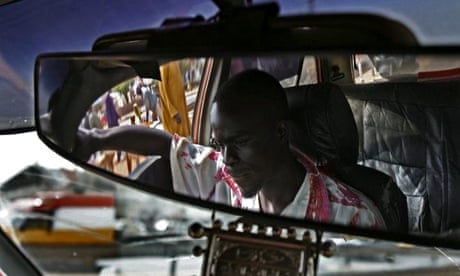Unemployment in Africa is a critical issue with massive implications for the continent's economies. When it comes to tackling the issue many across the continent see the role that education and the government play in preparing youth for sustainable livelihoods. Others place their bets on the private sector in creating – and sustaining – employment opportunities. But with unemployment at the huge scale it is at in Africa, it can feel like everyone and no-one's problem to deal with.
With this in mind, Ashoka's Future Forward initiative recently kicked off a series of online conversations aiming to clarify who is responsible for youth employment in Africa. Here's what three experts had to say:
'The private sector must lead, but it cannot lead alone'
All actors, including the youth, are responsible for transforming employment creation in Africa. However, this shared responsibility has led to no significant improvements in the capacity of youth to prepare for, identify, and be successful in generating sustainable livelihoods. Due to an increasing demand for talent, the private sector has the most to gain from a systemic change in how effectively and efficiently youth skills are matched to jobs. Therefore, the private sector must be at the forefront of driving solutions to youth unemployment in Africa.
Even though the private sector has the most to gain, it cannot act alone. Innovative partnerships between the private sector, non-profits and NGOs represent one of the most promising solutions to the youth employment challenge in Africa.
Eme Essien Lore, senior associate director, Africa regional office, The Rockefeller Foundation, Nairobi, Kenya
'Responsibility ultimately lies with African governments'
The greatest responsibility to increase employment opportunities for youth rests with African governments. These governments have to take a leaf out of China's book and build power plants, electricity grids, roads, railways and ports. They have to connect key markets and trading routes, disregarding artificial borders. The East African Community (EAC) has recently agreed upon a monetary union and more importantly, they have a regional plan to build new ports and railways that includes a $13.8bn Chinese-built railway.
This is a blueprint for more countries to follow. However, foreign partners, including nations such as France and new players such as China, can help. International organisations such as the World Bank have a role to play too.
Africa has a tremendous shortage of capital, yet it has enormous opportunities. Tony Elumelu makes a good case for long-term investment as a means of creating economic prosperity, jobs and social wealth. Here, investors in Asia, Europe and the US can help.
Africa needs better governance. African political leaders, its intellectuals, civic organisations and the people themselves have to end the divorce between the government and the people. Finally, what Africa needs is self-reliance and entrepreneurship. Already, small businesses, social enterprises and nonprofit organisations in places such as Kenya represent a new energy sweeping through the continent.
Atul Singh, founder and editor-in-chief, Fair Observer, California, USA
'We all have a collective responsibility, but the education sector is fundamental'
Currently, fewer than 10% of South African youth access higher education, of which only a fraction come from townships or rural communities. Poor matriculation results and low-awareness of post-school opportunities lead to high youth unemployment, estimated at more than 60% alone in Khayelitsha, a South African township where IkmvaYouth is headquartered.
The creation of more opportunities for meaningful youth employment is everyone's job. The government, the private sector, secondary and tertiary education institutions, parents and the youth themselves are all collectively responsible. However, just because it sits with everyone, this does not mean that we need to wait for the most resourced, or powerful, or co-ordinated stakeholders to get things going. We all have a role to play and a huge stake in the outcome. The strong ties between education and employment do, however, call for immediate solutions to create a far more effective education system.
When it comes to tackling unemployment the huge gaps in basic literacy and numeracy are a good place to start. This is particularly evident in South Africa where the gaps in learners' comprehension and basic conceptual foundations mean they need individual attention to supplement their schooling. To meet this need, the government, the private sector, secondary and tertiary education institutions, parents and the youth themselves need to trust one another and, in turn, learn to collaborate, coordinate and share resources and approaches.
Joy Olivier, founder, IkamvaYouth, Cape Town, South Africa
Tsega Belachew is community engagement and content strategist at Ashoka. Follow @Ashoka on Twitter.
Read more stories like this:
Six things they don't tell you about creating jobs for young people
Will the $100 million Digital Jobs Africa project solve unemployment?
We need a data revolution to gain an accurate picture of the jobs crisis
Join the community of global development professionals and experts. Become a GDPN member to get more stories like this direct to your inbox

Comments (…)
Sign in or create your Guardian account to join the discussion